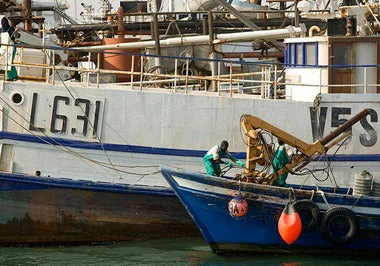 The value of the fishing and aquaculture industries exceeds US$190 billion annually and an estimated 240 million people depend on marine fisheries for their jobs. There’s no doubt that oceans generate big business. And where there’s profit to be made, there are sure to be people who don’t play by the rules. As a result, an estimated
18 percent of global fishing happens illegally.
The value of the fishing and aquaculture industries exceeds US$190 billion annually and an estimated 240 million people depend on marine fisheries for their jobs. There’s no doubt that oceans generate big business. And where there’s profit to be made, there are sure to be people who don’t play by the rules. As a result, an estimated
18 percent of global fishing happens illegally.
Why should this matter to people who care about development? Illegal fishing can undermine the livelihoods of poor people who depend on the ocean to make a living. The evasion of tax and royalty regimes can deprive developing countries up to hundreds of millions of dollars a year in much-needed revenues. In some regions, the rate of illegal fishing is high enough to endanger the sustainable management of a resource already stressed by overfishing.
The battle against illegal fishing is one that countries should take more seriously. In a recent paper, we lay out how policymakers might use techniques from the fight against illegal logging to combat illegal fishing. The Environmental and Natural Resources Law Enforcement (ENRLE) approach we propose includes a structured approach of crime prevention, detection, suppression, and recovery. Anti-illegal logging efforts have shown that this is more effective than randomly mixing and matching upstream and downstream law enforcement interventions.
Let me go over what this could mean in practice.
Prevention hinges on reducing the opportunity and the means to commit crime. This means reducing the open-access nature of fisheries, guarding resources, and regulating the fishing fleet by increasing the cost and effort necessary to commit illegal fishing.
Detection works to sap would-be criminals’ motives, and requires investments in surveillance and intelligence. When successful, detection can cause would-be criminals to think hard about the risk-reward equation.
Usually a strategy of last resort, suppression involves the criminal justice system pursuing, convicting and imposing sanctions against criminals. By increasing the risk and cost of illegal fishing, effective suppression acts as a deterrent.
This approach allows those who depend on environmental and natural resources to continue to pursue their livelihoods, while focusing its interventions on those in the business out of greed. It can also help map out institutions and actors for identifying investment and reform needs, and identify where choke points exist to address illegal fishing, and what tactics and strategies can be brought to bear on them. Finally, it can professionalize the effort against illegal fishing, as it enables a structured dialog involving authorities and actors across a wide spectrum of specialties and jurisdictions.
Globally, efforts to limit illegal fishing are still falling short. However, the promise of the ENRLE strategy is already apparent. For example, the West Africa Regional Fisheries Project – closely coordinated with activities supported by the United States, the Isle of Man, the United Kingdom, and the Environmental Justice Foundation – is proving the effectiveness of the approach, with reports coming in of increased availability of fish for small-scale fishermen following systematic law enforcement efforts targeting illegal fishing in that area.
Fishery managers require many policy reforms beyond improved law enforcement in order to rebalance global fish stocks. But if we are to succeed, tackling illegal fishing has to be part of the agenda. ENRLE is one approach that can help countries secure their resources for the people who depend on them most.
Note: This blog post summarizes an article currently in press for Environmental Development, co-authored by Klas Sander, Julian Lee, Valerie Hickey, Victor Bundi Mosoti, John Virdin, and William B. Magrath: Conceptualizing maritime environmental and natural resources law enforcement – The case of illegal fishing.
Photo: Fishing vessels off Namibia. John Hogg/World Bank


Join the Conversation